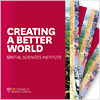druddell@usc.edu / (213) 740-0521 / AHF 57F
2009 Ph.D., Geography, Arizona State University
2005 M.S., Global Technology & Development, Arizona State University
1999 B.A., Political Science, San Diego State University
Darren M. Ruddell, Ph.D., is Associate Professor (Teaching) and Director of Graduate Studies at the Spatial Sciences Institute of the University of Southern California Dornsife College of Letters, Arts and Sciences.
The overarching focus of Ruddell’s research is climate and society, an expanding area in global change studies, which incorporates socio-ecological interactions across multiple scales of analysis. Ruddell is particularly interested in the dynamic relationship between human development and the modification of native landscapes which are altering physical processes, as witnessed in rising global temperatures and urban heat islands (UHI), and the subsequent impacts that changing environmental systems pose on human health and security. While a changing climate can offer more favorable conditions for human development in some parts of the world, changes in natural processes are increasingly threatening human security at local and regional scales as natural hazards and extreme weather events have become more frequent, more intense, and longer lasting.
Ruddell teaches and develops curricula in the Spatial Sciences Institute’s Human Security and Geospatial Intelligence (HSGI) academic programs offered at the undergraduate and graduate level. He has developed expertise in geographic information science and associated technologies to acquire, organize, analyze, model, and visualize spatial data. As an educator, he seeks to help students develop the critical and spatial thinking skills required to effectively manage and deploy these technologies in diverse scenarios to produce spatially-informed and scientifically sound results. He has been a leader in both developing and applying innovative pedagogical approaches in the fields of geodesign and Human Security and Geospatial Intelligence and implementing and advancing the delivery of course content in mixed modalities to increase access and user experience in synchronous and asynchronous settings.
Ruddell has performed extensive service to USC where he served as the Chair of the USC Academic Senate Sustainability Committee which advanced sustainability initiatives across the university in addition to serving as President of the Dornsife College Faculty Council. He currently serves on the editorial board of the International Journal of Sustainable Land Use and Urban Planning.
Ruddell is certified as a Geographic Information Science Professional (GISP) by the Geographic Information Science Certification Institute (GISCI).
Selected Works:
Ruddell, D., & K. Foster (2018). GIS&T and Geodesign. The Geographic Information Science & Technology Body of Knowledge (3rd Quarter 2018 Edition), John P. Wilson (Ed).
VoPham, T., Wilson, J.P., Ruddell, D., Rashed., T., Brooks, M., Yuan, J., Talbott, E., Chang, C. & Weissfeld, J.L., Linking pesticides and human health: a geographic information system (GIS) and Landsat remote sensing method to estimate agricultural pesticide exposure. Applied Geography, 62, 171-181, 2015, doi:10.1016.j.apgeog.2015.04.009.
Harlan, S.L., Chowell, G., Yang., S., Petitti, D.B., Morales Butler, E.J., Ruddell, B.L., Ruddell, D.M., Heat-Related Deaths in Hot Cities: Estimates of Human Tolerance to High Temperature Thresholds. International Journal of Environmental Research and Public Health, 11(30), 3304-3326, 2014.
Ruddell, D. & Dixon, P.G., The energy-water nexus: Are there tradeoffs between residential energy and water consumption in arid cities? International Journal of Biometeorology, 58(7), 1421-1431, 2013, doi:10:1007/s00484-013-0743-y.
Harlan, S. L., & D. Ruddell (2011). Climate Change and Health in Cities: Impacts of Heat and Air Pollution and Potential Co-Benefits from Mitigation and Adaptation. Current Opinion in Environmental Sustainability 3:126-134.
Ruddell, D., S. L. Harlan, S. Grossman-Clarke, & A. Buyantuyev (2010). Risk and Exposure to Extreme Heat in Microclimates of Phoenix, AZ. In P. Showalter and Y. Lu (Eds.), Geospatial techniques in urban hazard and disaster analysis. Springer, pp. 179-202.



